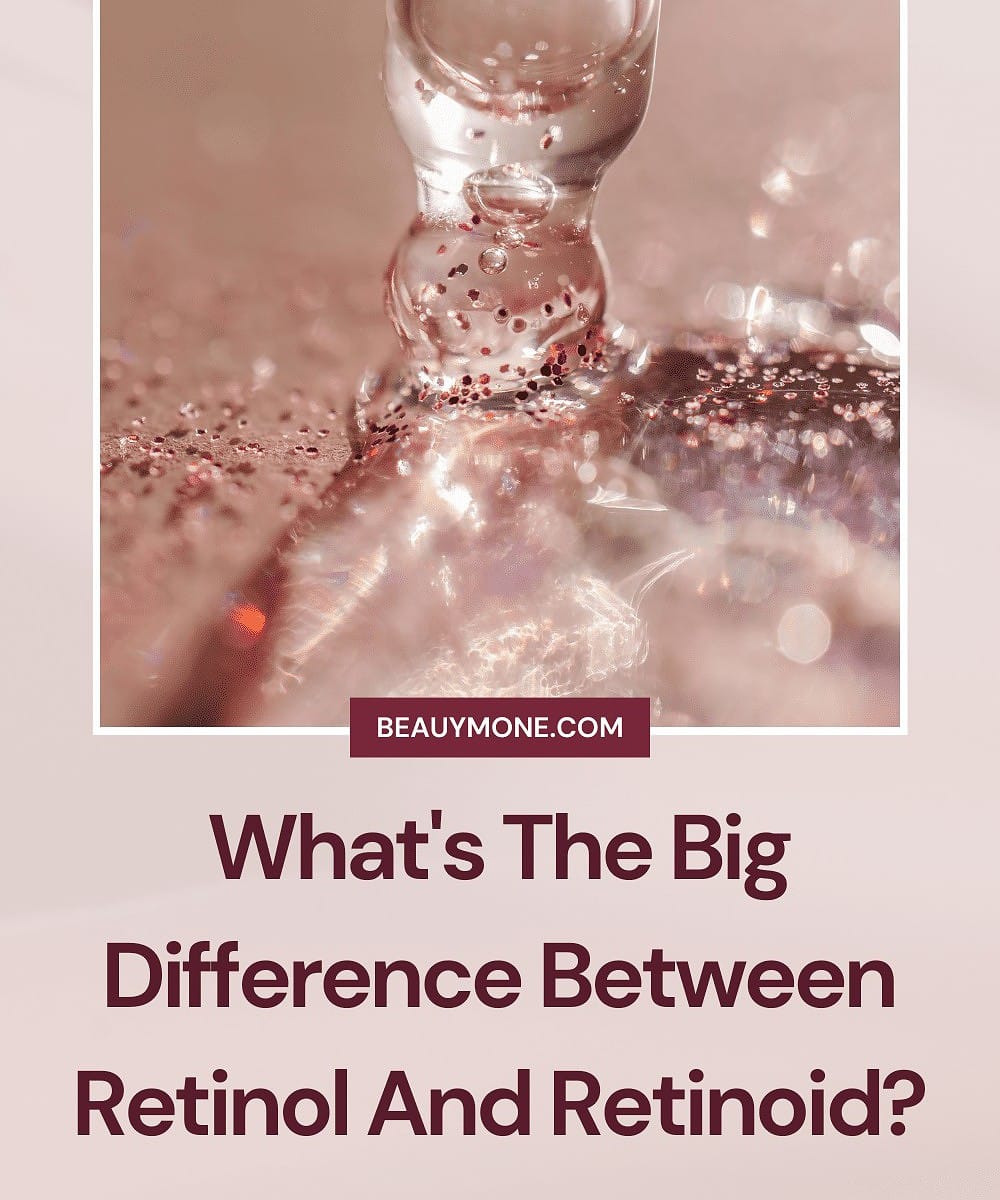
Among the most confusing topics in the beauty industry is the difference between retinol and retinoids. Are they the same thing? Are they interchangeable? And which one is better for your skin?
In this blog post, you’ll discover the following:
- If retinol and retinoid are the same thing
- What the difference is between retinol and retinoids
- Who should or shouldn’t use retinol or retinoids
- How to use both the ingredients
- And so much more, so keep on reading
What Are Retinols?
Retinols, together with other retinoids, like retinyl palmitate and retinoic acid, are a vitamin A derivative, which is among the vital nutrients in the body for improving cell turnover. It is added to topical skincare products to enhance skin renewal, boost collagen production, reduce acne, and brighten skin tone.
Additionally, retinol acts as an antioxidant to address free radical damage that results in visible signs of aging. According to most dermatologists, retinol is the vital ingredient with the ability to do it all in dermatology, both medically and cosmetically.
A gold standard in skincare, retinol sweeps away dead skin cells, dull skin, and clogged pores.
What Are Retinoids?
Retinoids are a group or class of chemicals derived from vitamin A. The fact that they’re derived from vitamin A means that they possess functional or structural similarities to vitamin A. Retinoids can be synthetic or natural. They come in different forms and types, like retinyl esters, retinal, and retinol.
Their two forms are oral and topical. The latter refers to liquids, gels, and creams which you can apply on the skin directly. Oral retinoids, on the other hand, include capsules and tablets which you take by mouth.
They play a role in skin health and immunity. Retinoids are beneficial in terms of unclogging pores, reducing inflammation, and reducing the appearance of wrinkles. Moreover, they regulate the development of cells on the skin’s surface.
More potent retinoids are effective at treating skin conditions like pigmentary disorder, acne, psoriasis, and different types of cancer. The strongest ones are notorious for being irritating.
So, Is Retinol The Same As Retinoid?
Now as the name suggests, retinol and retinoid are related – but still different. It all comes down to the molecular structure of vitamin A – retinol is just a specific type of retinoid. And retinoid is a broad term for any vitamin A derivative.
The term retinoid includes both over-the-counter retinol and prescription retinoids. These derivatives of vitamin A are converted into retinoic acid for use in skincare.

Difference Between Retinol And Retinoid
Even though retinol is a specific type of retinoid, there are still some factors that inform the difference between retinol and retinoid. The differences include the following;
Efficacy On Skin
When used within the same period, some retinoids achieve superior results compared to retinol, particularly in anti-aging and boosting collagen production for brighter, healthier, and firmer skin. Nonetheless, this is based on the same concentration.
Note: Other retinoids are likely to irritate.
Retinoids such as tretinoin are twenty times more potent compared to retinol. At a concentration of 0.025%, tretinoin is an equivalent of 0.5% retinol. This means that the effect on skin regeneration, wrinkle improvement, and skin plumping would be better than retinol.
When it comes to wrinkle reduction and anti-aging, retinal at the optimal 1% concentration remains the best choice. It helps keep the skin smooth and firm without negative reactions.
Note: Only use tretinoin for 5 – 6 months to improve your skin’s condition. Overusing it can cause more harm than good.
Retinol is handy for maintaining and enhancing smooth and shiny skin. For this reason, you can utilize retinol for an extensive period and enjoy similar results as a retinoid such as tretinoin at 0.05% concentration but with minimal side effects.
Production Modulation
Retinol, a relatively weak retinoid, is converted to an active form, retinoid acid, within your skin. It functions by modulating genes’ expression involved in skin barrier function, collagen production, and cell turnover.
Retinoids modulate a wider range of skin processes. For instance, tretinoin works by binding to certain receptors in the skin by the name RARs (retinoic acid receptors). Upon activation of the receptors, they can modulate gene expression for improved collagen production, cell turnover, and a reduction of inflammation.
Availability
The availability of these two differs in terms of where and how you can get them.
Retinol, a type of retinoid, is available in countless skincare products, including lotions, serums, and creams. Typically, you can get these products over the counter. You can purchase them at online retailers, beauty supply stores, and drugstores without a prescription. Since retinol is more of a cosmetic ingredient than a drug, the FDA does not regulate it. There aren’t any restrictions on its use.
On the flip side, retinoids are only available by prescription in the U.S. You can get FDA-regulated products, such as tretinoin, tazarotene, and adapalene, only with a prescription from a medical professional. The main reason is that retinoids are more potent and boast a greater potential for side effects compared to retinol.
Price
Retinol products tend to be more pocket-friendly compared to prescription retinoids. Their prices vary depending on the brand, container size, and concentration.
Retinoids are costlier than retinol. Factors that inform their prices include dosage strength, brand, and type of retinoid.
Some insurance policies might cover the cost of prescribed retinoids if their use is in treating medical conditions such as psoriasis or acne. Generally, insurance does not cover over-the-counter retinol products.
Uses
Retinoids and retinol bring with them different uses based on their availability, effectiveness, and potency.
Primarily, retinol is widely used in skin care products because of its anti-aging benefits. They’re handy at helping improve the appearance of wrinkles and fine lines, increase collagen production, and enhance skin tone and texture. Since retinol tends to be gentler than retinoids, it might be the ideal choice for those with sensitive skin.
Retinoids are more potent than retinol. They’re handy for a range of skin conditions. Tretinoin, for instance, is used as a treatment for acne due to its ability to reduce inflammation, increase cell turnover, and unclog pores. Others, such as tazarotene and adapalene, are prescribed for other skin conditions like psoriasis.
Who Should Try Retinol/Retinoids?
Retinol or retinoids can be beneficial for a wide range of people looking to improve their skin. They are particularly helpful for those who want to reduce the appearance of fine lines, wrinkles, and age spots. Retinoids can also be effective for treating acne and improving overall skin texture and tone.
Who Shouldn’t Take Retinol/Retinoids?
Retinol is ideal for different skin types. However, it is prudent to settle for the right products. On top of that, you need to have a gentle skincare routine that caters to your skin’s needs without causing rashes or irritation.
One group that should avoid using retinol or any retinoid product is lactating or pregnant women. The use of these products during pregnancy might cause multiple side effects on the developing fetus and embryo, including premature delivery, miscarriage, and a range of birth defects.
FRS, which is a condition that affects the fetus during pregnancy because of taking these products, causes the following;
- Heart abnormalities
- Growth delays during infancy or before birth
- Microcephaly
- Hearing loss, missing ears, and low-set ears
- Facial and skull malformations
- Central nervous system issues
- Learning disabilities and developmental delays
Another group that should avoid using retinoids is those with eczema or rosacea. Eczema is a chronic condition of the skin that causes inflamed, itchy, and red skin. Because the skin barrier of folks with eczema is compromised, it means that their skin is more prone to allergens and irritants.
Retinol could irritate the skin, especially in high concentrations that might exacerbate eczema symptoms and cause further inflammation and irritation.
On the other hand, Rosacea is a chronic inflammatory skin condition that causes visible blood vessels, bumps, and redness on the face. Just like with eczema, retinol might also irritate your skin if you’re grappling with rosacea since it causes peeling and dryness. It can also magnify the visible blood vessels on your face.
The negative side effects of retinol and other retinoids include dryness, burning, and redness of the skin especially when you use them for the first time. To be on the safe side, perform allergy testing steps before deciding which one to use.
Begin with once or twice every week and only use low-concentrated products such as retinol. If, after two weeks, your skin isn’t irritated, you can gradually increase the frequency or opt for other retinoids featuring a higher concentration.
A good trick to reduce irritation is to apply anti-inflammatory cream once you’ve applied retinol.

How To Use Retinoids
Here are some tips on how to use retinoids effectively;
Begin Slowly
When starting, it is prudent to begin with, a low concentration and progressively increase the amount and frequency used over time. Doing this will reduce side effects such as dryness, peeling, and redness.
Consider Applying At Night
Use retinoids at night since they can make your skin sensitive to sunlight. Before you go to bed, apply some small amounts on clean, dry skin. Avoid applying the product to sensitive areas such as the corners of your mouth and eyes.
Avoid Combining With Other Active Ingredients
Some retinoids can irritate the skin when you use them together with other active ingredients, such as benzoyl peroxide or alpha-hydroxy acids. If you are currently using several active ingredients, it is wise to utilize them at various times of the day. Alternatively, you can use them on alternating days.
Consult A Dermatologist
Do you have sensitive skin? Are you unsure about how to incorporate retinoids into your beauty routine? It is a great idea to consult a dermatologist for advice.
Can You Use Retinol And Retinoid Together?
It’s possible to use both a cosmetic retinol product and a retinoid product prescribed by a doctor. The order in which they are applied is up to the individual.
However, it’s important to note that using too many retinol products at once may not be beneficial and may even lead to skin irritation, such as flaking, redness, or sensitivity.
In such cases, it’s recommended to reduce the frequency of use or stop using multiple retinol products altogether. Remember, starting slowly and increasing usage gradually is better to avoid any negative effects.
Final Words On The Difference Between Retinol And Retinoid
Understanding the difference between retinol and retinoids is important for your beauty routine. Armed with the knowledge we’ve shared in this guide, you can confidently navigate the beauty aisle and choose the right product for your skin.
Whether you prefer the gentle approach of retinol or the heavy-hitting power of retinoids, remember to start slow and always wear sunscreen. Happy skin, happy life!
Frequently Asked Questions
